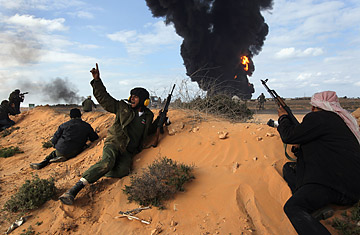(THIS ARTICLE IS MACHINE TRANSLATED by Google from Norwegian)
The Norwegian narrative of the Libya war has changed significantly. From an almost unison understanding that the war was right and good in 2011, it has become clearer and clearer in recent years that the war was both unnecessary and disastrously unthinkable. The price is still being paid by the Libyans themselves: From being one of Africa's most prosperous countries, the country now, almost eight years after NATO bombing, is still characterized by chaos, crime and regional divide. If there is a state in North Africa that today deserves the term "failed state", it must be Libya.
Much has been written in the past about how to prevent such wars in the future in the best possible way. For example, some have demanded open-ended treatment if Norway is to participate in war. Others, including the Petersen Committee, which this fall released its report on the war, have proposed to set up groups in the civil service that will be tasked with promoting countermeasures and "checklists" to politicians along the way.
All these are good suggestions, we should carry on with them. But what will be the response of the peace movement when the war is underway, or even more so – when the war is formally ended? After all, it is easier to be against a war than to give constructive answers to what to do when one loses just that fight.
The first priority must be to put in place effective humanitarian aid and support for reconstruction assistance. This requirement, no matter how obvious it may sound, is in stark contrast to what Norway actually did. In February 2017, Prime Minister Erna Solberg stated that Norway had no «special responsibility for finding solutions and contributing to stabilization work afterwards». Here, the peace movement's response should be consistent and clear: Of course, going to war and dropping 588 bombs over a country means that one has a "special responsibility" to help afterwards!
A fair rule of thumb might be to estimate the cost of the damage we contributed. This should be possible by organizing investigative commissions made up of representatives from both Norway and the state where the war may have taken place.
For Libya, Norway dropped 588 bombs across the country. By examining where these hit, at least as far as possible, one can also estimate the volume of destruction, and thus the cost. Payments should then be coordinated through UN agencies so that they are not exploited for purely political purposes.
Norway's responsibility for today's situation in Libya must be debatable. Of course, it is not Norway's fault alone that it has become the way it has become. But we are not irresponsible. No one forced us to release the bombs we dropped – 15 percent of the total. Decisions to go to war are the most serious decisions a politician can make. The main task of the peace movement should always be to do what it can to prevent war from becoming politicians' answers. But if we fail in that task, the requirement should be that the responsibility subsequently follows the degree of seriousness. Perhaps we will then release more disasters of the Libya type.


